Health and Illness: Functionalist and Marxist Perspectives Case Study
VerifiedAdded on 2020/07/23
|6
|1180
|534
Case Study
AI Summary
This case study examines the sociological and biological definitions of health and illness, highlighting their similarities and differences. It explores the functionalist perspective, which views health as essential for societal functioning and illness as a form of deviance, using a case example of an unemployed man and his family suffering from health issues due to poor living conditions and alcohol consumption. The assignment also delves into the Marxist perspective, emphasizing the impact of economic structures on health outcomes, particularly the role of income and wealth in determining living standards and access to healthcare. The case study contrasts the experiences of the unemployed man with those of a family with higher income and education, illustrating how socioeconomic factors influence health and well-being, as supported by various academic references.

Case study
Paraphrase This Document
Need a fresh take? Get an instant paraphrase of this document with our AI Paraphraser
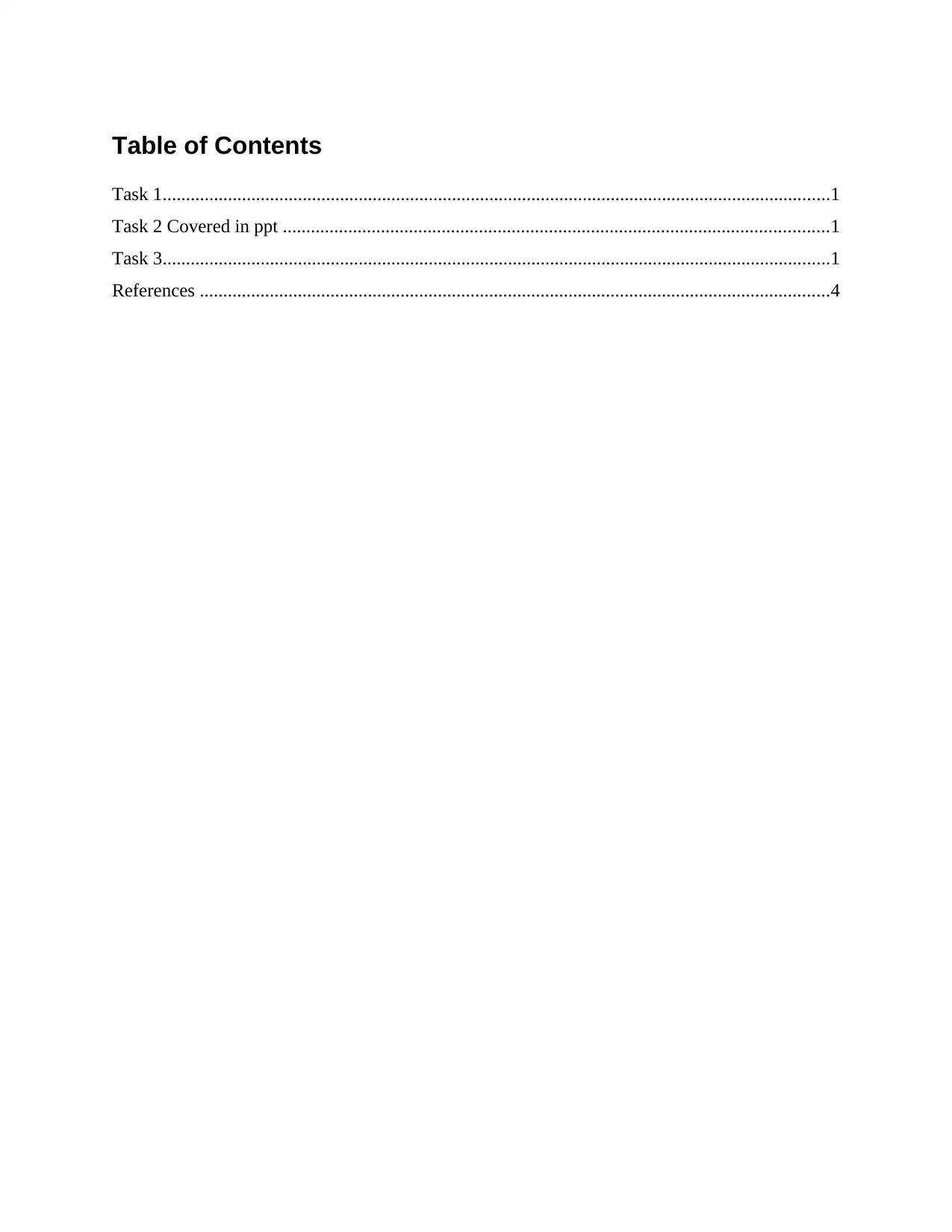
Table of Contents
Task 1...............................................................................................................................................1
Task 2 Covered in ppt .....................................................................................................................1
Task 3...............................................................................................................................................1
References .......................................................................................................................................4
Task 1...............................................................................................................................................1
Task 2 Covered in ppt .....................................................................................................................1
Task 3...............................................................................................................................................1
References .......................................................................................................................................4
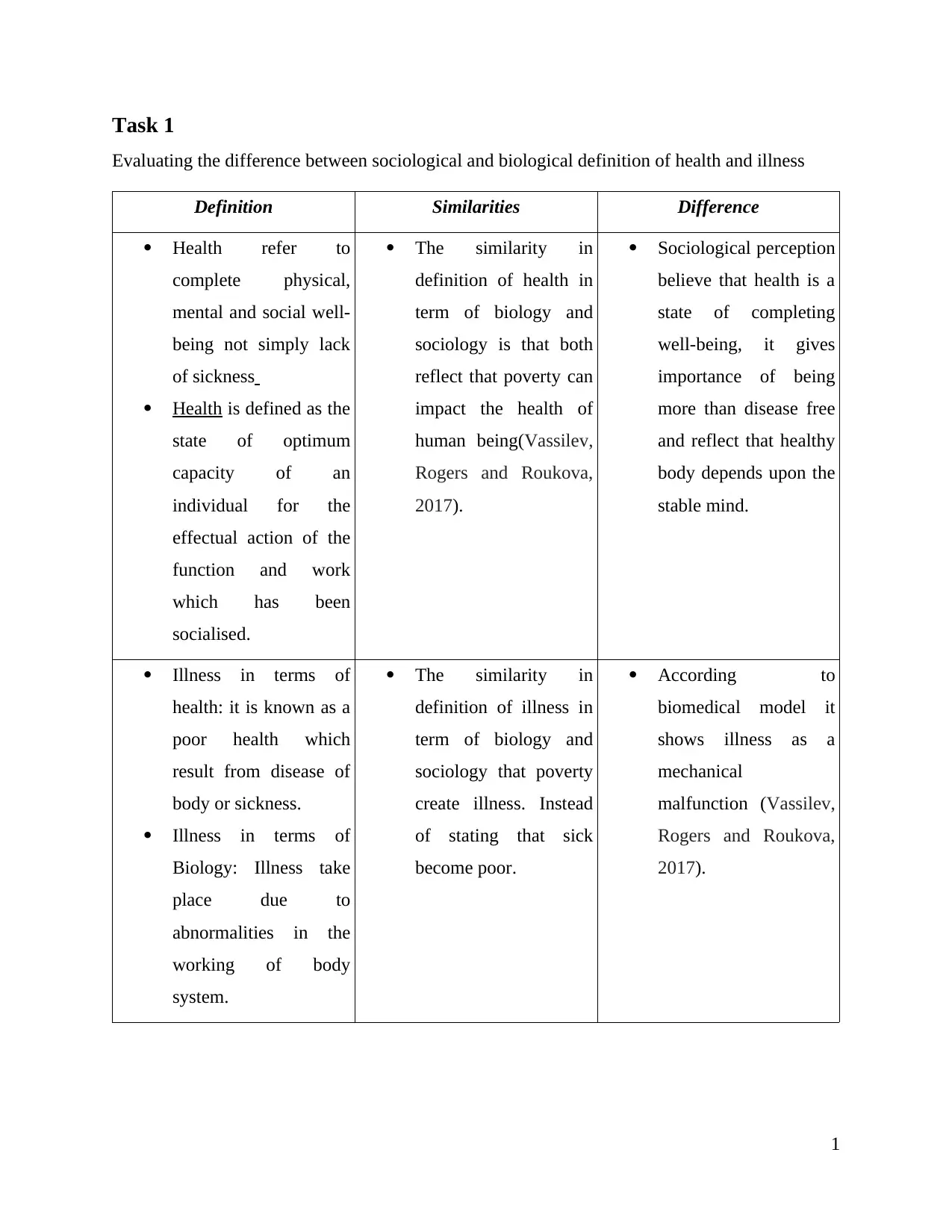
Task 1
Evaluating the difference between sociological and biological definition of health and illness
Definition Similarities Difference
Health refer to
complete physical,
mental and social well-
being not simply lack
of sickness
Health is defined as the
state of optimum
capacity of an
individual for the
effectual action of the
function and work
which has been
socialised.
The similarity in
definition of health in
term of biology and
sociology is that both
reflect that poverty can
impact the health of
human being(Vassilev,
Rogers and Roukova,
2017).
Sociological perception
believe that health is a
state of completing
well-being, it gives
importance of being
more than disease free
and reflect that healthy
body depends upon the
stable mind.
Illness in terms of
health: it is known as a
poor health which
result from disease of
body or sickness.
Illness in terms of
Biology: Illness take
place due to
abnormalities in the
working of body
system.
The similarity in
definition of illness in
term of biology and
sociology that poverty
create illness. Instead
of stating that sick
become poor.
According to
biomedical model it
shows illness as a
mechanical
malfunction (Vassilev,
Rogers and Roukova,
2017).
1
Evaluating the difference between sociological and biological definition of health and illness
Definition Similarities Difference
Health refer to
complete physical,
mental and social well-
being not simply lack
of sickness
Health is defined as the
state of optimum
capacity of an
individual for the
effectual action of the
function and work
which has been
socialised.
The similarity in
definition of health in
term of biology and
sociology is that both
reflect that poverty can
impact the health of
human being(Vassilev,
Rogers and Roukova,
2017).
Sociological perception
believe that health is a
state of completing
well-being, it gives
importance of being
more than disease free
and reflect that healthy
body depends upon the
stable mind.
Illness in terms of
health: it is known as a
poor health which
result from disease of
body or sickness.
Illness in terms of
Biology: Illness take
place due to
abnormalities in the
working of body
system.
The similarity in
definition of illness in
term of biology and
sociology that poverty
create illness. Instead
of stating that sick
become poor.
According to
biomedical model it
shows illness as a
mechanical
malfunction (Vassilev,
Rogers and Roukova,
2017).
1
⊘ This is a preview!⊘
Do you want full access?
Subscribe today to unlock all pages.

Trusted by 1+ million students worldwide
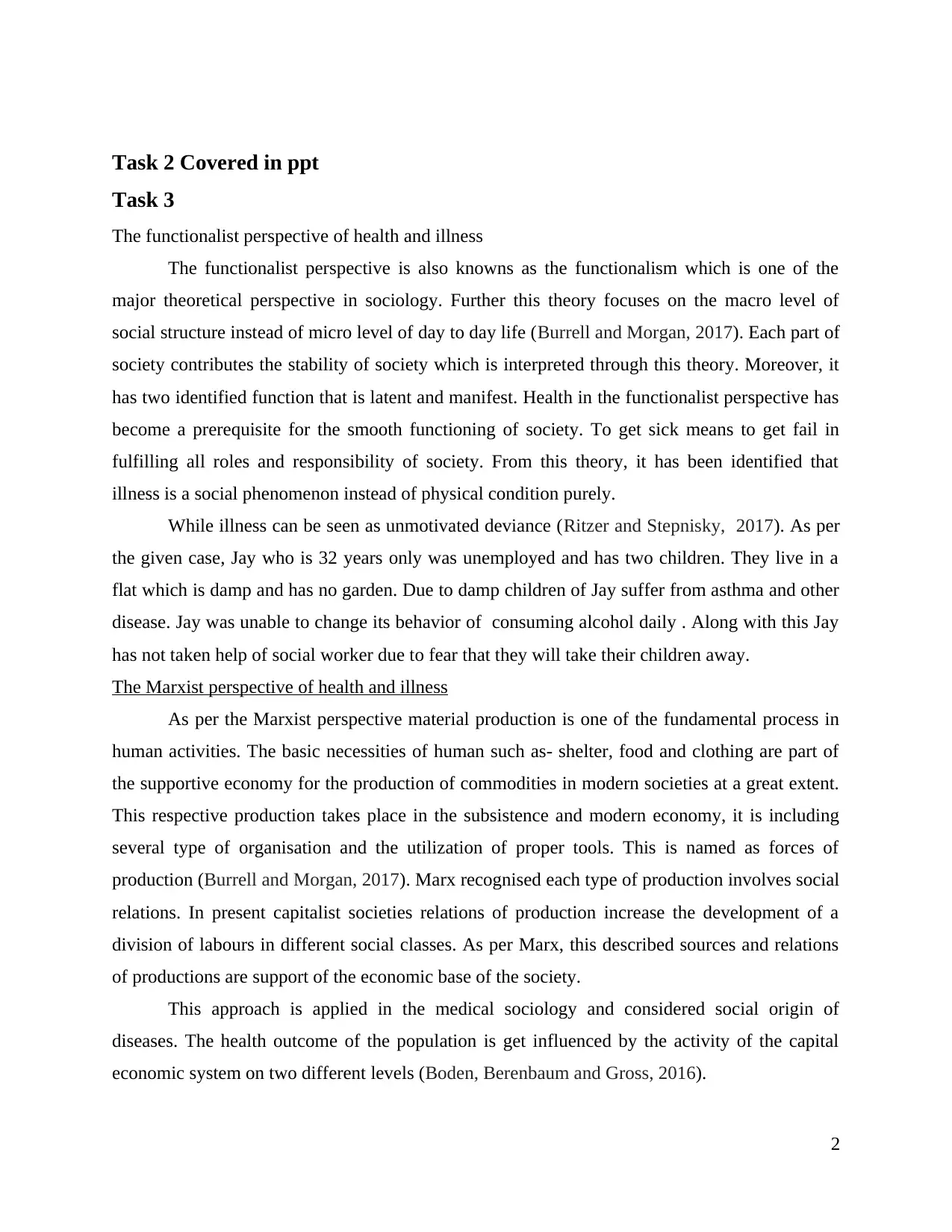
Task 2 Covered in ppt
Task 3
The functionalist perspective of health and illness
The functionalist perspective is also knowns as the functionalism which is one of the
major theoretical perspective in sociology. Further this theory focuses on the macro level of
social structure instead of micro level of day to day life (Burrell and Morgan, 2017). Each part of
society contributes the stability of society which is interpreted through this theory. Moreover, it
has two identified function that is latent and manifest. Health in the functionalist perspective has
become a prerequisite for the smooth functioning of society. To get sick means to get fail in
fulfilling all roles and responsibility of society. From this theory, it has been identified that
illness is a social phenomenon instead of physical condition purely.
While illness can be seen as unmotivated deviance (Ritzer and Stepnisky, 2017). As per
the given case, Jay who is 32 years only was unemployed and has two children. They live in a
flat which is damp and has no garden. Due to damp children of Jay suffer from asthma and other
disease. Jay was unable to change its behavior of consuming alcohol daily . Along with this Jay
has not taken help of social worker due to fear that they will take their children away.
The Marxist perspective of health and illness
As per the Marxist perspective material production is one of the fundamental process in
human activities. The basic necessities of human such as- shelter, food and clothing are part of
the supportive economy for the production of commodities in modern societies at a great extent.
This respective production takes place in the subsistence and modern economy, it is including
several type of organisation and the utilization of proper tools. This is named as forces of
production (Burrell and Morgan, 2017). Marx recognised each type of production involves social
relations. In present capitalist societies relations of production increase the development of a
division of labours in different social classes. As per Marx, this described sources and relations
of productions are support of the economic base of the society.
This approach is applied in the medical sociology and considered social origin of
diseases. The health outcome of the population is get influenced by the activity of the capital
economic system on two different levels (Boden, Berenbaum and Gross, 2016).
2
Task 3
The functionalist perspective of health and illness
The functionalist perspective is also knowns as the functionalism which is one of the
major theoretical perspective in sociology. Further this theory focuses on the macro level of
social structure instead of micro level of day to day life (Burrell and Morgan, 2017). Each part of
society contributes the stability of society which is interpreted through this theory. Moreover, it
has two identified function that is latent and manifest. Health in the functionalist perspective has
become a prerequisite for the smooth functioning of society. To get sick means to get fail in
fulfilling all roles and responsibility of society. From this theory, it has been identified that
illness is a social phenomenon instead of physical condition purely.
While illness can be seen as unmotivated deviance (Ritzer and Stepnisky, 2017). As per
the given case, Jay who is 32 years only was unemployed and has two children. They live in a
flat which is damp and has no garden. Due to damp children of Jay suffer from asthma and other
disease. Jay was unable to change its behavior of consuming alcohol daily . Along with this Jay
has not taken help of social worker due to fear that they will take their children away.
The Marxist perspective of health and illness
As per the Marxist perspective material production is one of the fundamental process in
human activities. The basic necessities of human such as- shelter, food and clothing are part of
the supportive economy for the production of commodities in modern societies at a great extent.
This respective production takes place in the subsistence and modern economy, it is including
several type of organisation and the utilization of proper tools. This is named as forces of
production (Burrell and Morgan, 2017). Marx recognised each type of production involves social
relations. In present capitalist societies relations of production increase the development of a
division of labours in different social classes. As per Marx, this described sources and relations
of productions are support of the economic base of the society.
This approach is applied in the medical sociology and considered social origin of
diseases. The health outcome of the population is get influenced by the activity of the capital
economic system on two different levels (Boden, Berenbaum and Gross, 2016).
2
Paraphrase This Document
Need a fresh take? Get an instant paraphrase of this document with our AI Paraphraser
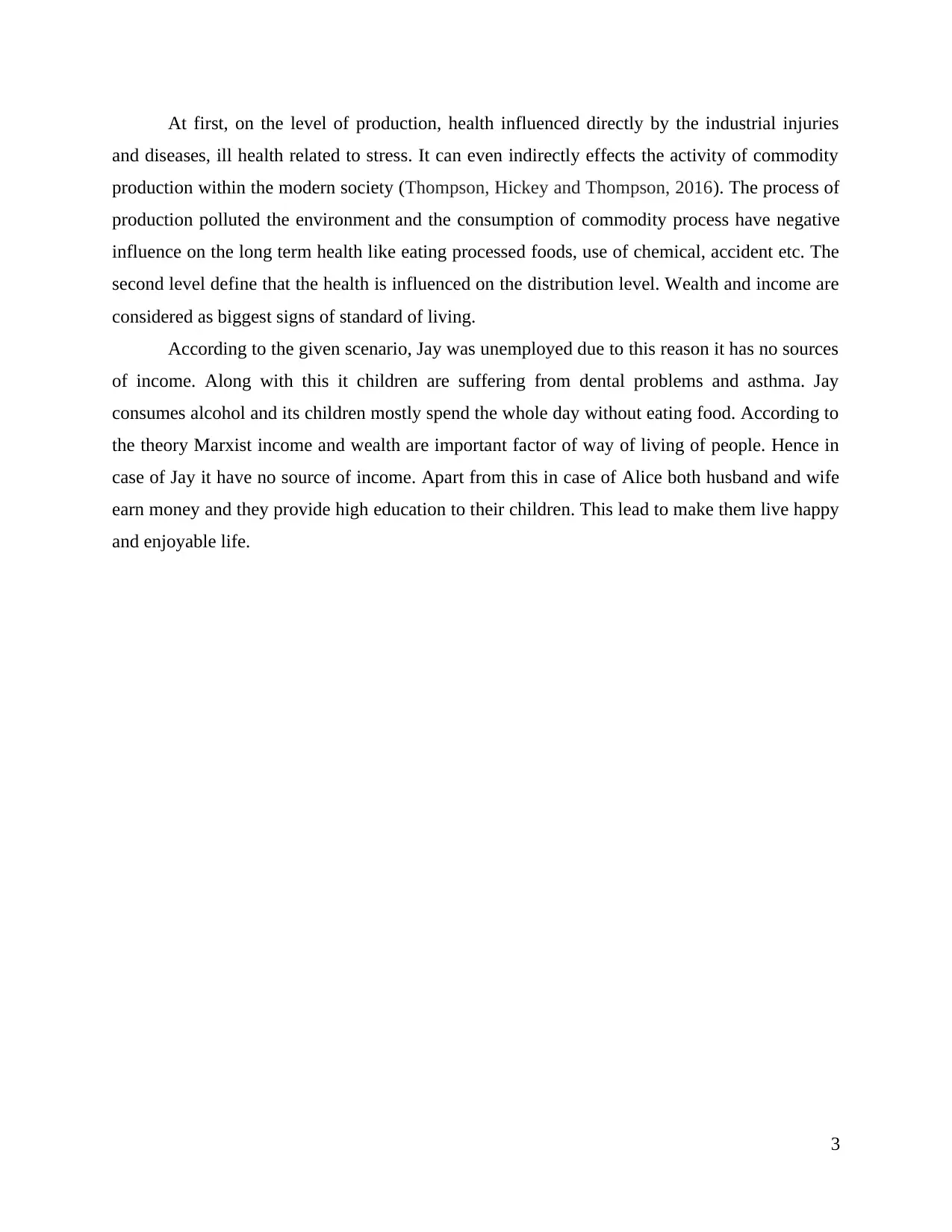
At first, on the level of production, health influenced directly by the industrial injuries
and diseases, ill health related to stress. It can even indirectly effects the activity of commodity
production within the modern society (Thompson, Hickey and Thompson, 2016). The process of
production polluted the environment and the consumption of commodity process have negative
influence on the long term health like eating processed foods, use of chemical, accident etc. The
second level define that the health is influenced on the distribution level. Wealth and income are
considered as biggest signs of standard of living.
According to the given scenario, Jay was unemployed due to this reason it has no sources
of income. Along with this it children are suffering from dental problems and asthma. Jay
consumes alcohol and its children mostly spend the whole day without eating food. According to
the theory Marxist income and wealth are important factor of way of living of people. Hence in
case of Jay it have no source of income. Apart from this in case of Alice both husband and wife
earn money and they provide high education to their children. This lead to make them live happy
and enjoyable life.
3
and diseases, ill health related to stress. It can even indirectly effects the activity of commodity
production within the modern society (Thompson, Hickey and Thompson, 2016). The process of
production polluted the environment and the consumption of commodity process have negative
influence on the long term health like eating processed foods, use of chemical, accident etc. The
second level define that the health is influenced on the distribution level. Wealth and income are
considered as biggest signs of standard of living.
According to the given scenario, Jay was unemployed due to this reason it has no sources
of income. Along with this it children are suffering from dental problems and asthma. Jay
consumes alcohol and its children mostly spend the whole day without eating food. According to
the theory Marxist income and wealth are important factor of way of living of people. Hence in
case of Jay it have no source of income. Apart from this in case of Alice both husband and wife
earn money and they provide high education to their children. This lead to make them live happy
and enjoyable life.
3
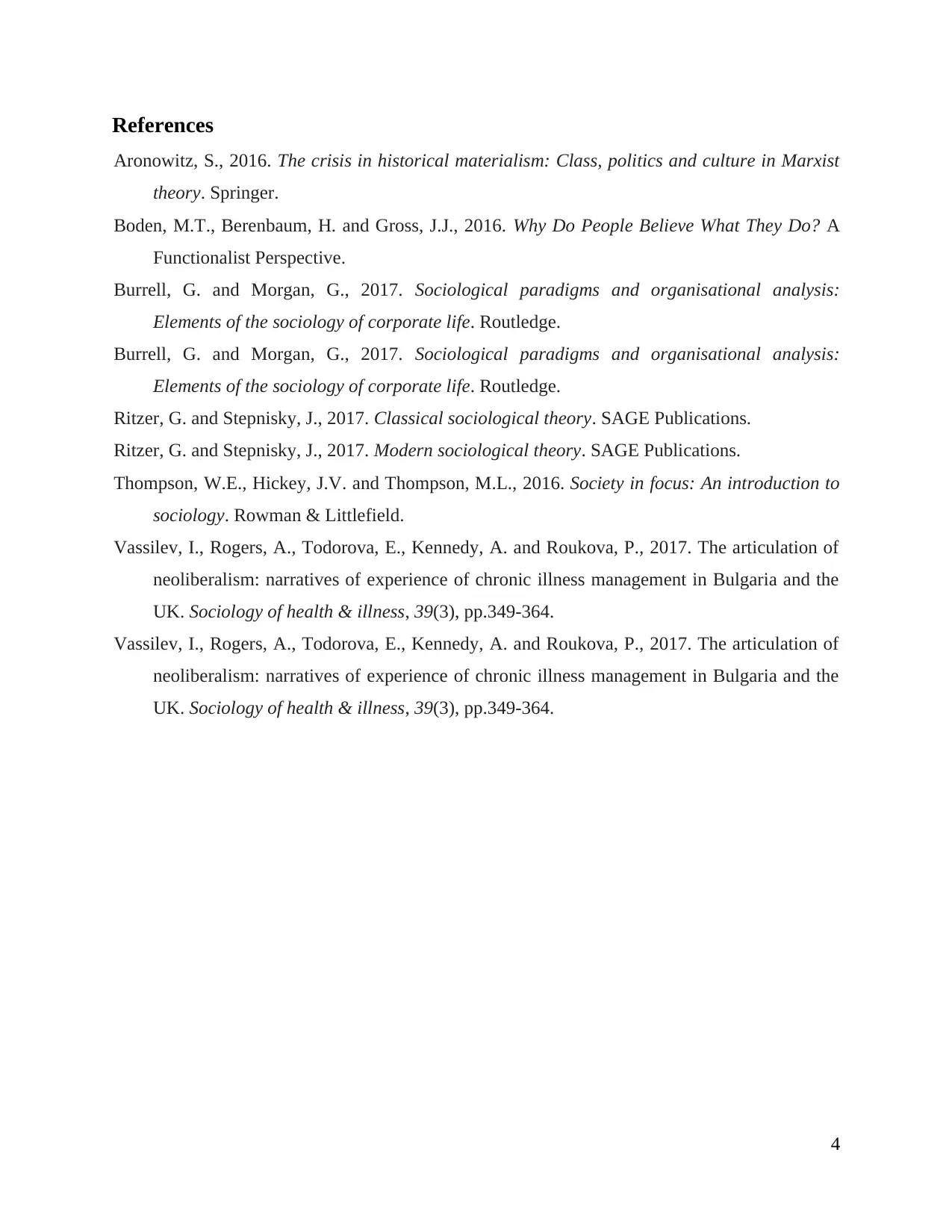
References
Aronowitz, S., 2016. The crisis in historical materialism: Class, politics and culture in Marxist
theory. Springer.
Boden, M.T., Berenbaum, H. and Gross, J.J., 2016. Why Do People Believe What They Do? A
Functionalist Perspective.
Burrell, G. and Morgan, G., 2017. Sociological paradigms and organisational analysis:
Elements of the sociology of corporate life. Routledge.
Burrell, G. and Morgan, G., 2017. Sociological paradigms and organisational analysis:
Elements of the sociology of corporate life. Routledge.
Ritzer, G. and Stepnisky, J., 2017. Classical sociological theory. SAGE Publications.
Ritzer, G. and Stepnisky, J., 2017. Modern sociological theory. SAGE Publications.
Thompson, W.E., Hickey, J.V. and Thompson, M.L., 2016. Society in focus: An introduction to
sociology. Rowman & Littlefield.
Vassilev, I., Rogers, A., Todorova, E., Kennedy, A. and Roukova, P., 2017. The articulation of
neoliberalism: narratives of experience of chronic illness management in Bulgaria and the
UK. Sociology of health & illness, 39(3), pp.349-364.
Vassilev, I., Rogers, A., Todorova, E., Kennedy, A. and Roukova, P., 2017. The articulation of
neoliberalism: narratives of experience of chronic illness management in Bulgaria and the
UK. Sociology of health & illness, 39(3), pp.349-364.
4
Aronowitz, S., 2016. The crisis in historical materialism: Class, politics and culture in Marxist
theory. Springer.
Boden, M.T., Berenbaum, H. and Gross, J.J., 2016. Why Do People Believe What They Do? A
Functionalist Perspective.
Burrell, G. and Morgan, G., 2017. Sociological paradigms and organisational analysis:
Elements of the sociology of corporate life. Routledge.
Burrell, G. and Morgan, G., 2017. Sociological paradigms and organisational analysis:
Elements of the sociology of corporate life. Routledge.
Ritzer, G. and Stepnisky, J., 2017. Classical sociological theory. SAGE Publications.
Ritzer, G. and Stepnisky, J., 2017. Modern sociological theory. SAGE Publications.
Thompson, W.E., Hickey, J.V. and Thompson, M.L., 2016. Society in focus: An introduction to
sociology. Rowman & Littlefield.
Vassilev, I., Rogers, A., Todorova, E., Kennedy, A. and Roukova, P., 2017. The articulation of
neoliberalism: narratives of experience of chronic illness management in Bulgaria and the
UK. Sociology of health & illness, 39(3), pp.349-364.
Vassilev, I., Rogers, A., Todorova, E., Kennedy, A. and Roukova, P., 2017. The articulation of
neoliberalism: narratives of experience of chronic illness management in Bulgaria and the
UK. Sociology of health & illness, 39(3), pp.349-364.
4
⊘ This is a preview!⊘
Do you want full access?
Subscribe today to unlock all pages.

Trusted by 1+ million students worldwide
1 out of 6
Related Documents
Your All-in-One AI-Powered Toolkit for Academic Success.
+13062052269
info@desklib.com
Available 24*7 on WhatsApp / Email
![[object Object]](/_next/static/media/star-bottom.7253800d.svg)
Unlock your academic potential
Copyright © 2020–2026 A2Z Services. All Rights Reserved. Developed and managed by ZUCOL.





